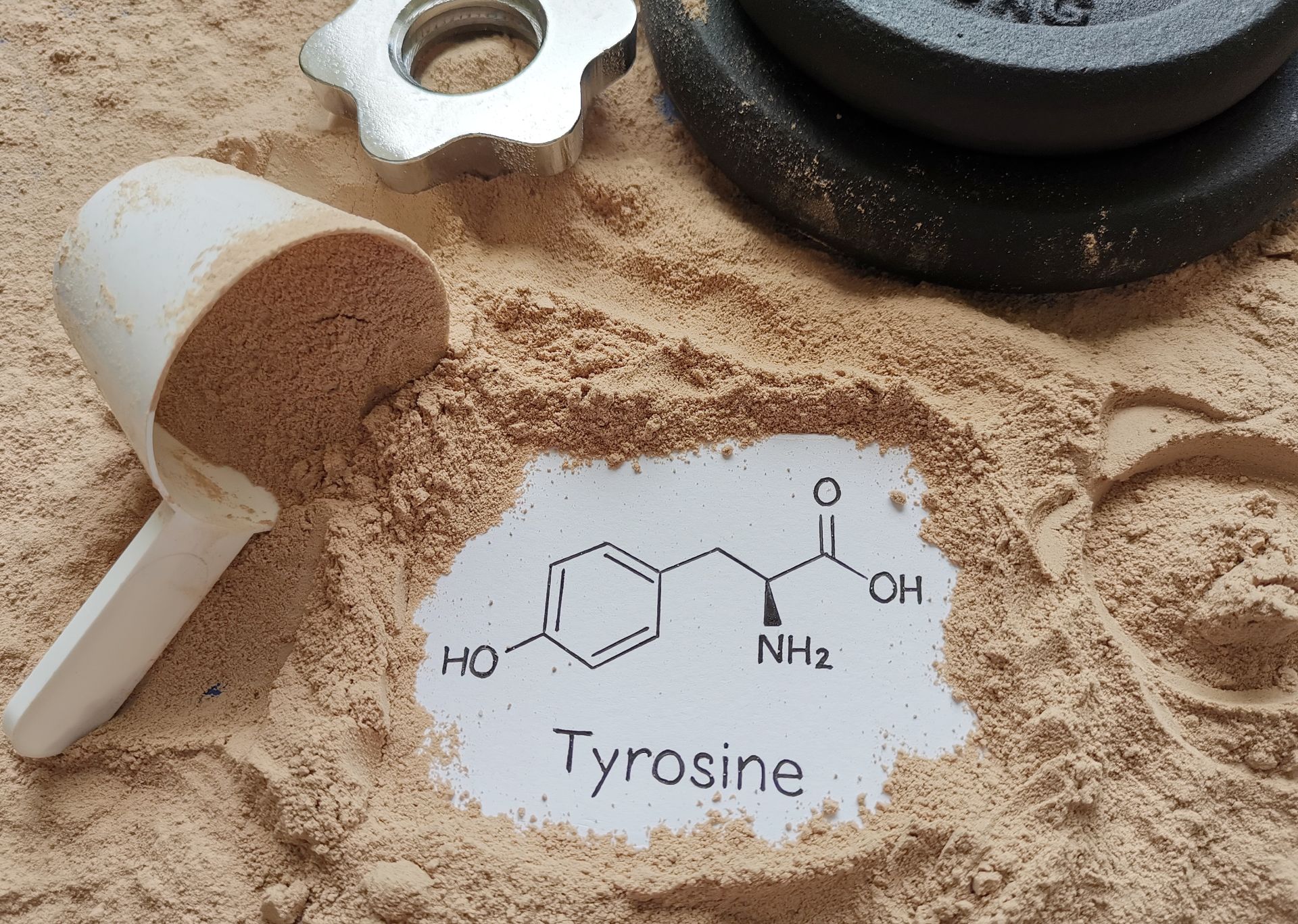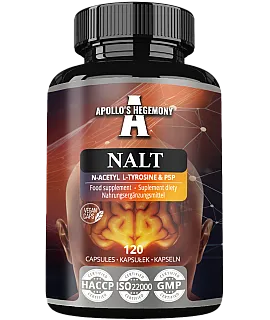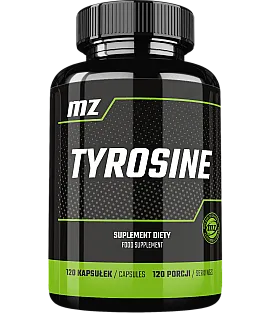Tyrosine - what is it and what properties does it have?

Tyrosine is one of many amino acids. What distinguishes it? In the body, we create substances from it that are extremely attractive to us: dopamine and norepinephrine. Tyrosine supplementation is mainly believed to improve energy, motivation and mood. From this article you will learn what exactly tyrosine is, how it works in the human body and how best to supplement it. Read to the end!
- What is tyrosine?
- Tyrosine in supplementation
- Tyrosine dosage
- Properties of tyrosine
- Tyrosine as a nootropic
- Tyrosine and stress
- Tyrosine for the thyroid gland?
- Summary
What is tyrosine?
L-Tyrosine is an endogenous amino acid. This means that the human body is able to produce it on its own. However, there is a condition. For optimal synthesis of tyrosine, an adequate supply of L-phenylalanine is needed, which in turn is an essential amino acid that must be supplied from the diet. To provide an adequate supply of tyrosine and phenylalanine, it is necessary to consume an adequate amount of complete protein, so it is worth focusing on such products as meats, eggs, dairy, fish and legumes.
In the body, tyrosineis used as a building block for many structures. Tyrosine can be used for various types of peptide and protein chains, but also hormones or neurotransmitters. Tyrosine's reputation comes mainly from being a precursor for building:
- dopamine,
- thyroid hormones.
Tyrosine easily crosses the blood-brain barrier, after which it is drawn into nerve cells. There it enters a series of chemical reactions that lead to the formation of dopamine.
Today, tyrosine is one of the most popular single amino acids in supplementation to support brain performance. Other popular amino acids for this purpose include L-theanine, L-tryptophan and L-carnitine in acetylated form, although they have different profiles of action.
Tyrosine in supplementation
Tyrosine can be found in dietary supplements in two forms:
- L-Tyrosine in its free form,
- N-Acetyl L-Tyrosine (NALT).
NALT seems to be the more popular choice when the goal is to affect mind and concentration. It usually comes in the form of 500 mg capsules, and it is customary for users to use smaller doses of NALT than free L-tyrosine. Because of the smaller dose, supplementation is more convenient.
Tyrosine dosage
When using NALT, the most common regimen involves the use of 500-2000 mg per day. This is usually taken in one serving, in the morning on an empty stomach.
Free L-tyrosine is usually taken more, or at least seems reasonable. In clinical trials, single doses are usually 100 or 150 mg per kilogram of body weight. This will therefore be:
- 6-9 g of L-Tyrosine for a 60 kg person;
- 8-12 g of L-Tyrosine for a person weighing 80 kg;
- 10-15 g of L-Tyrosine for a 100 kg person.
Occasionally, studies note an even higher dose of as much as 300 mg of tyrosine per kilogram of body weight.
Properties of tyrosine
As an amino acid, tyrosine is a building block for a variety of peptide and protein structures. It is a precursor to many molecules that are important to us, with the most interesting information relating to the production of thyroid hormones and the excitatory neurotransmitters dopamine and norepinephrine.
Tyrosine as a nootropic
Most of the research and publications on tyrosine concern its effects on cognitive function. This is also usually the main purpose of choosing supplements with tyrosine.
Tyrosine is a precursor to catecholamines. Their increase usually means a reduction in fatigue with a concomitant motivational and cognitive boost. Energizing substances are usually most readily used for learning and mental work, as their effects are felt quickly and help to prolong effective focus time.
However, it is important to remember that tyrosine is not a typical stimulant. On its own, it will never work as well as caffeine, theacrine, nicotine or other stimulants. Tyrosine is more of a supplement that is used to keep you from losing the resources you need too quickly.
We can compare it to driving a sports car. A car with a powerful engine can achieve great performance when you press the accelerator harder, but then it also burns fuel faster. When the fuel is gone from the tank, the car will stop. A powerful engine is not enough when there are no resources to work with.
The same is true, for example, with intensive study. Suppose you have a lot of material to absorb and on this occasion you drink more coffee to make your brain work more efficiently. Such intensive learning, especially when supported by an extra dose of caffeine, is a stress for the brain. Stress depletes catecholamines faster than usual. And this poses the risk that their reserves will quickly be depleted and the brain will slow down significantly. Charging yourself with tyrosine in advance is designed to delay this moment, since catecholamine stores can renew themselves on an ongoing basis.

Tyrosine and stress
Severe stress makes quite a mess in the body. Sometimes it takes a while for everything to return to homeostasis. Tyrosine can be one way to at least partially prevent this mess, as we already lightly mentioned in the previous paragraph.
Taking tyrosine before the onset of expected stress helps prevent depletion of dopamine stores. In one study, participants were given L-tyrosine at a dose of 100 mg per kg of body weight before a 4.5-hour exposure to cold and hypoxia. The results showed that tyrosine significantly reduced symptoms such as mood deterioration and impaired performance in subjects who showed an average or greater response to these environmental conditions.
Similar observations have been made in numerous in vivo studies in rodents.
Tyrosine for the thyroid gland?
Among other things, we use tyrosine to build thyroid hormones. We know that there is an important link between tyrosine and thyroid in physiology, but in terms of studies testing the effects of supplementation, there is not much data. There are references in the literature indicating various links between thyroid hormone levels and dietary supply of phenylalanine and tyrosine, but these date back several decades.
An interesting observation regarding the effect of tyrosine supplementation on thyroid function was made during a study on people stationed in Antarctica. There it was noted that tyrosine supplementation during the winter lowered TSH by 28%, while placebo raised it by 18%. At the same time, an improvement in mood was also noted, when in the placebo group mood was noticeably lowered.
At present, it is hard to say unequivocally that tyrosine supplementation will raise thyroid hormone levels. When that specifically is the goal, more attention should be paid to micronutrients such as iodine, selenium and zinc. In the case of tyrosine, the effect on the thyroid can be viewed as a hypothetical additional benefit.
Summary
Tyrosine supplementation, even on a one-time basis, can help maintain performance in healthy individuals exposed to demanding situational conditions. Some people supplement with tyrosine daily, but the best effects seem to be revealed when supplementing with increased doses before expected stress that could, for example, impair cognitive function or mood. With all this said, tyrosine is a very safe supplement, as the body has mechanisms in place to protect itself from excessive increases in dopamine and norepinephrine by increasing tyrosine supply.
If you often struggle with stress that makes it difficult for you to focus and maintain a good mood, then you can definitely consider including tyrosine in your supplement plan.
Sources:
 ⮜ Previous article
⮜ Previous article
What should you know about probiotics? Interesting facts and useful tips
 – wlasciwosci zdrowotne i dawkowanie.jpg) Next article ⮞
Next article ⮞

